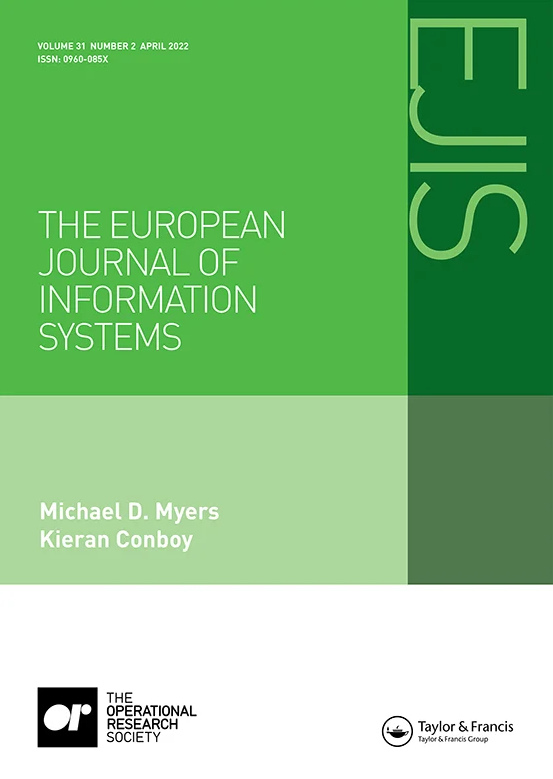
EJIS - volume 27 - 2018 论文列表 |
| 点击这里查看 European Journal of Information Systems 的JCR分区、影响因子等信息 |
Volume 27, Number 6, 2018
Samir Chatterjee Jongbok Byun Kaushik Dutta Rasmus Ulslev Pedersen Akshay Pottathil Harry (Qi) Xie
Feedback, task performance, and interface preferences. Opinion seeking in a social network-enabled product review website: a study of word-of-mouth in the era of digital social networks. Taking on sacred cows: openness, fair critique, and retaining value when revising classics.Volume 27, Number 5, 2018
Greta L. Polites Christina Serrano Jason Bennett Thatcher Kevin Matthews
"How does tech make you feel?" a review and examination of negative affective responses to technology use. The effects of relative and criticism-based performance appraisals on task-level escalation in an IT project: a laboratory experiment. Transparency in literature reviews: an assessment of reporting practices across review types and genres in top IS journals.Volume 27, Number 4, 2018
Anna Maria Oberländer Maximilian Röglinger Michael Rosemann Alexandra Kees Pär J. Ågerfalk Virpi Tuunainen
The insider on the outside: a novel system for the detection of information leakers in social networks.Giuseppe Cascavilla Mauro Conti David G. Schwartz Inbal Yahav
Disaggregation of the IT capital effects on firm performance: Empirical evidence from an IT asset portfolio perspective.Tae Hun Kim Matthew Wimble Vallabh Sambamurthy Frantz Rowe Jason Bennett Thatcher
Reversed loss aversion in crowdsourcing contest.Haichao Zheng Bo Xu Linna Hao Zhangxi Lin Dov Te&aposeni Evangelos Katsamakas
Stakeholders' enactment of competing logics in IT governance: polarization, compromise or synthesis?Albert Boonstra U. Yeliz Eseryel Marjolein van Offenbeek Frantz Rowe Régis Meissonier
User response to mandatory IT use: a coping theory perspective.Anol Bhattacherjee Christopher J. Davis Amy J. Connolly Neset Hikmet Frantz Rowe Régis Meissonier
Volume 27, Number 3, 2018
Mike W. Chiasson Elizabeth J. Davidson Jenifer Sunrise Winter Nik Rushdi Hassan John Mingers Bernd Stahl
Phronesis, argumentation and puzzle solving in IS research: illustrating an approach to phronetic IS research practice.Ojelanki K. Ngwenyama Stefan Klein Nik Rushdi Hassan John Mingers Bernd Stahl
From sovereign IT governance to liberal IT governmentality? A Foucauldian analogy.Aurélie Leclercq-Vandelannoitte Emmanuel Bertin
A critical realist script for creative theorising in information systems.Clay K. Williams Donald E. Wynn Jr. Nik Rushdi Hassan John Mingers Bernd Stahl
What's in a face? Making sense of tangible information systems in terms of Peircean semiotics.Paul Beynon-Davies Nik Rushdi Hassan John Mingers Bernd Carsten Stahl
The IT artifact and its spirit: a nexus of human values, affordances, symbolic expressions, and IT features.Mustapha Cheikh-Ammar Nik Rushdi Hassan John Mingers Bernd Stahl
Philosophy and information systems: where are we and where should we go?Volume 27, Number 2, 2018
Tanguy Coenen Liesje Coertjens Peter Vlerick Marije Lesterhuis Anneleen Viona Mortier Vincent Donche Pieter Ballon Sven De Maeyer Ken Peffers Tuure Tuunanen Björn Niehaves
Design principles for sensemaking support systems in environmental sustainability transformations.Stefan Seidel Leona Chandra Kruse Nadine Székely Michael Gau Daniel Stieger Ken Peffers Tuure Tuunanen Björn Niehaves Kalle Lyytinen
Modeling interferences in information systems design for cyberphysical systems: Insights from a smart grid application.Tobias Brandt Stefan Feuerriegel Dirk Neumann Ken Peffers Tuure Tuunanen Björn Niehaves Anders Hjalmarsson
ERP prototype with built-in task and process support.Tamara Babaian Jennifer Xu Wendy T. Lucas Ken Peffers Tuure Tuunanen Björn Niehaves
Design and evaluation of a model-driven decision support system for repurposing electric vehicle batteries.Benjamin Klör Markus Monhof Daniel Beverungen Sebastian Braäer Björn Niehaves Tuure Tuunanen Ken Peffers
Considering the social impacts of artefacts in information systems design science research.Gerard M. De Leoz Stacie Petter Ken Peffers Tuure Tuunanen Björn Niehaves
Aesthetics in design science research.Richard L. Baskerville Mala Kaul Veda C. Storey Ken Peffers Tuure Tuunanen Björn Niehaves
Design science research genres: introduction to the special issue on exemplars and criteria for applicable design science research. Whither design science research?Volume 27, Number 1, 2018
Assessing the robustness of meta-analytic results in information systems: publication bias and outliers.
Sven Kepes Manoj A. Thomas Frantz Rowe Mark Silver
Online health communities: how do community members build the trust required to adopt information and form close relationships?Hanmei Fan Reeva Lederman Frantz Rowe Sabine Matook
Adding background music as new stimuli of interest to information systems research.David Gefen René Riedl Dov Te&aposeni Ryad Titah
Intention-behaviour misalignment at B2C websites: when the horse brings itself to water, will it drink?Greta L. Polites Elena Karahanna Larry Seligman Pär J. Ågerfalk Iris Junglas
Knowledge exchange roles and EKR performance impact: extending the theory of knowledge reuse.Nicole Forsgren Rajiv Sabherwal Alexandra Durcikova Frantz Rowe Andrew Hardin
Going through changes.
